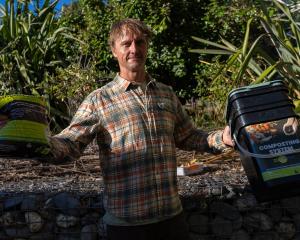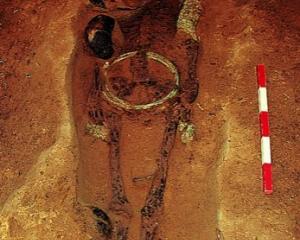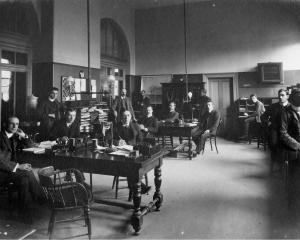After more than 30 years of labour, the opening could truly be said to be one of Haast's finest hours.
Five years later, when the link between Haast and Fox Glacier opened, the rain hosed down and a slip closed the road immediately.
But, that's another story.
This story is about Dennis Nolan, who would have loved to see his sister, Nola Cron, share the ribbon-cutting ceremony with then minister of works Hugh Watt.
William Dennis Nolan (Din or Dinny) had died two years before, aged 82. But from the early 1900s to the end of his days, he'd bombarded New Zealand politicians and the Otago Expansion League with letters pleading to start and, later, to finish the Haast road.
We'll probably never know exactly how many letters and telegrams he sent because most of his meticulously carbon-copied correspondence, which he hung on No8 wire hooks in wardrobes and sheds, was burned after his death.
His granddaughter Neroli Nolan, now chairwoman of the Haast road celebration committee, rescued the last hook from a shed many years ago and was astounded to unearth a mine of information.
"He tried every angle to get the road done ... Apparently, he even used to send whitebait to Parliament," Ms Nolan said.
The remains of Dinny's papers include letters from friends and visitors supporting his campaign, as well as responses from officials.
Importantly, they include five pages of a copy of a South Westland history Dinny Nolan sent to a Mr E. Wilson of 299 York Pl, Dunedin, dated April 27, 1945.
Neroli is now scanning all the documents, as well as some of Dinny's letters and poetry she has found. Once the collection has been digitised, she will donate the originals to the Hokitika Museum.
Dinny Nolan was born at the Arawata Settlement, near Jackson Bay, in 1877, the fifth of Andrew and Mary Nolan's 10 children. Andrew and Mary (nee Spillane) were among the original settlers in Jackson Bay, arriving on April 12, 1875.
By 1882, the Nolans couldn't live in the bay any more. It was not the land of milk and honey and the beaches were not covered in gold. They moved north to Okuru, where at least they could grow potatoes and catch eels.
The short trip up the coast was not without mishap. The open boat tipped and all the children went into the sea. Dinny later said it was the scariest moment of his life.
Like many Westland children of his generation, Dinny did not have much formal education and taught himself to read, write, type and write poetry.
He was said always to have a dictionary on his knee and some of his many poems were later published by one of his sons, Bill Nolan, in The Droving Days.
Most of the Nolan family had left the inhospitable district behind by 1914, but Dinny was a stayer.
In 1913, he married Mary Ritchie, from Jacobs River, and they had five sons, Bill, Robbie, Eddie, Des and Kevin.
Although Dinny rarely strayed from the West Coast, he was keen for his sons to broaden their horizons, so he sent them to St Kevin's College, Oamaru.
He was a man for hard work. When the boys were at home, they worked all day and spent evenings chopping wood.
He was highly principled and dead against drink.
The story goes that he would arrive at Jackson Bay to supervise a ship unloading and locals would go to great lengths to bribe ship captains to hide the kegs until he had gone home.
He was also an entrepreneur and had great dreams of getting Haast's industry going. He built a sawmill, started a cheese factory to export to the United Kingdom and set up a whitebait cannery.
His business endeavours were initially successful but did not last long because of unreliable and infrequent sea services. Air services commenced in the mid-'30s but these, too, were weather-dependent.
All the time, Dinny was pushing for an access road and in 1930, he and John Cron and Norman Wallis went to Parliament to urge their case.
They extracted a promise from the Labour Party that if Labour got to power, the road would be built.
On July 23, 1936, the Otago Daily Times devoted most of a page to the visit to Haast by a large delegation of officials.
This physically taxing inspection of the route from Pembroke to Haast employed motorcars, horses, shanks' pony, aircraft and boats.
When Labour was elected, an elated Dinny cabled friends and contacts at Lake Hawea.
To the Ewings of Makarora, he telegrammed: "Keep the billy boiling we will see you by car in the near future".
To the Capells of Hawea Flat: "We will be motoring to your door in the near future".
In 1938-1939, work started at both the Haast and Makarora road ends.
However, progress stalled during World War 2 and it took years and screeds more ink and paper from Dinny before it was completed.
In 1945, he wrote to Mr Wilson of York Pl, Dunedin " ... strong agitation is afoot by Local Bodies Associations and other organisations endeavouring to persuade the Government to complete this great national highway".
With prescient foresight, he wrote of the great fillip the road would be to South Island tourism and the alleviation of isolation.
He also wrote of the need to control deer numbers in the forest and how a road would introduce more hunters who could help "exterminate this pest, or at least compel them to retire to the extreme fastness of the extensive mountain ranges".
And he sorrowed that Westland was languishing in a semi-stagnant state "all for the want of seventy miles of main highway and including three bridges, awaiting for the turn of mind of some Government with a progressive and colonising policy".
Although he never saw the road open, he lived to see his ambition being realised.
The final "big push" by road crews came in the 1950s, when Dinny was an old but still energetic letter-writer.
His granddaughter Neroli was a small child at the road opening.
"I see these celebrations as a celebration of a whole lot of things. But it is really the celebration of the end of isolation.
"When that road opened, Dad [Robbie Nolan] would take five of us kids and usually a couple of others and we could go to Ettrick and pick strawberries and gorge ourselves on strawberries too. Then we would go for a swim at the Roxburgh baths and have fish and chips at Cromwell and come home again ...
"How's that for a day's outing? We used to take three sick buckets with us cos we all got sick. It was just a nightmare, that road. It was dusty and bumpy and hot and everyone would shout `put the windows up'.
"The reason we went away and back in one day is it wasn't so much of a rigmarole. We could bring back more stuff and wouldn't have to turn the generator off [at home] for several days. And we would often forget things and have to return home five times before we got going," she said.
One of Dinny's poems was a tribute to Bill O'Leary, or Arawata Bill.
I often think and ponder, you'll pardon me I ken,
But will our rising generation produce such grand old men?
These are words his family think easily apply to himself.












